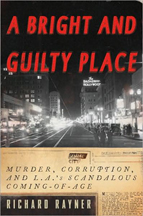 Los Angeles (pronounce it with a hard G, please) has long been touted as a paradise of sunshine, good health, and fresh starts, but anyone who’s ever seen one of the dozens of classic films noir that are set there or read a novel authored by Raymond Chandler, Ross MacDonald, or a dozen other hardboiled writers knows there’s another side to the City of Angels, that it is, as Chandler wrote, a town “dark with something more than night.”
Los Angeles (pronounce it with a hard G, please) has long been touted as a paradise of sunshine, good health, and fresh starts, but anyone who’s ever seen one of the dozens of classic films noir that are set there or read a novel authored by Raymond Chandler, Ross MacDonald, or a dozen other hardboiled writers knows there’s another side to the City of Angels, that it is, as Chandler wrote, a town “dark with something more than night.”
Every big city (and a good many small ones, too) has its underbelly, of course, but in Los Angeles, we are perhaps more startled when it’s exposed, in large part because of the sunny (in both senses of the word) image the Chamber of Commerce and tourism boards have so long promoted.
In Richard Rayner‘s gripping A Bright and Guilty Place: Murder, Corruption, and L.A.’s Scandalous Coming of Age (the title borrows and alters a line of dialogue uttered by Orson Welles in 1947’s The Lady from Shanghai), a nonfiction account of corruption and crime in the late 1920s and early ’30s, when Los Angeles was the fastest growing city in the world and the foundation for its status as the dark heart of noir was being laid, he explores how the darkness so widely associated with sunny Los Angeles first began to take hold.
Rayner anchors his account of shadows overtaking a metropolis to events in the lives of two widely forgotten figures — Leslie T. White, a tubercular everyman who found himself quickly swept from his quiet life as a portrait photographer in a small town north of L.A. into a role as one of the first crime scene investigators for the Los Angeles district attorney’s office, and Dave Clark, a handsome and athletic golden boy of an attorney who grew up in the city and seemed ever destined for greatness.
Throw in gentleman (and not-so-gentlemanly) gangsters, crooked DA’s, crooked oil magnates, more dames and molls than you could shake a stick at, a flood of biblical proportions, and even Raymond Chandler himself, in his days as an oil executive, and you’ve got a story that proves as gripping as the most suspenseful novel.
We won’t spoil the story for you — and there’s plenty of story — but it’s rare when a nonfiction book proves to be such a page-turner. We found we didn’t want to put Rayner’s book down, and we think you’ll feel the same. We’d love to see a movie made from this book — in the right hands, it could easily match L.A. Confidential, a picture we like a good deal, intrigue for intrigue. Are you listening, Hollywood?
